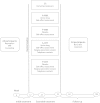Using extended cognitive behavioral treatment and medication to treat dependent smokers
- PMID: 21653904
- PMCID: PMC3222443
- DOI: 10.2105/AJPH.2010.300084
Using extended cognitive behavioral treatment and medication to treat dependent smokers
Abstract
Objectives: We evaluated smoking-cessation efficacy of an extended course of sustained-release bupropion (bupropion SR) and cognitive-behavioral treatment (CBT).
Methods: Participants who smoked at least 10 cigarettes per day and who smoked within 30 minutes of arising (n = 406) completed a 12-week smoking-cessation treatment including group counseling, nicotine-replacement therapy, and bupropion SR. Participants were then randomly assigned to 1 of 5 conditions: (1) no further treatment, (2) active bupropion SR for 40 weeks, (3) placebo for 40 weeks, (4) active bupropion SR and 11 sessions of CBT for 40 weeks (A-CBT), or (5) placebo and 11 sessions of CBT for 40 weeks. Participants were assessed at baseline and at weeks 12, 24, 52, 64, and 104.
Results: A-CBT was not superior to the other 3 extended treatments. From weeks 12 through 104, all extended treatment conditions were superior to standard treatment. At weeks 64 and 104, the 2 CBT conditions produced significantly higher abstinence rates than did the other 3 conditions.
Conclusions: Brief contact with providers can increase abstinence during treatment. CBT may increase long-term abstinence after extended treatment is terminated.
Figures



References
-
- The Tobacco Use and Dependence Clinical Practice Guideline panel, staff, and consortium representatives. A clinical practice guideline for treating tobacco use and dependence: a US Public Health Service report. JAMA. 2000;283(24):3244–3254. - PubMed
-
- Fiore MC, Jaen CR, Baker TB, et al. Treating Tobacco Use and Dependence: 2008 Update. Rockville, MD: US Dept of Health and Human Services, Public Health Service; 2008.
-
- Hays JT, Hurt RD, Rigotti N, et al. Sustained-release bupropion for pharmacologic relapse prevention after smoking cessation: a randomized, controlled trial. Ann Intern Med. 2001;135(6):423–433. - PubMed
-
- Hurt RD, Krook JE, Croghan IT, et al. Nicotine patch therapy based on smoking rate followed by bupropion for prevention of relapse to smoking. J Clin Oncol. 2003;21(5):914–920. - PubMed
Publication types
MeSH terms
Substances
Grants and funding
LinkOut - more resources
Full Text Sources
Research Materials

